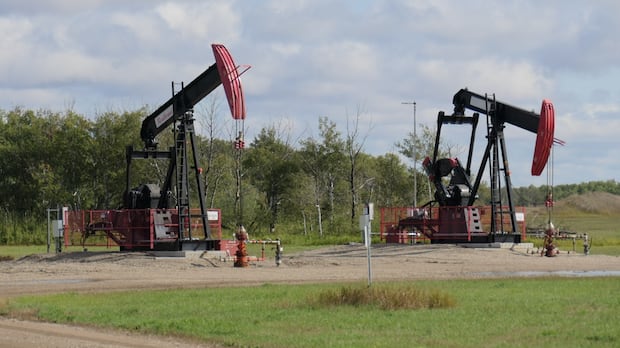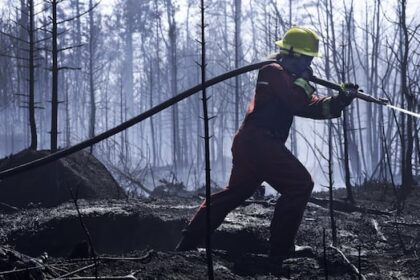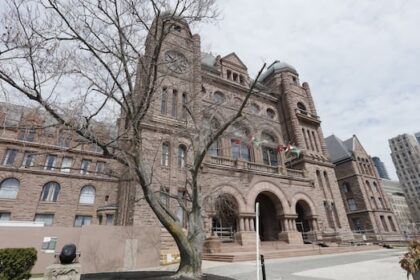ManitobaTwo First Nations are suing the Manitoba and federal government, claiming land and mineral rights to the southwest corner of the province, where the annual value of oil and gas produced exceeds $1.3 billion.’This property is being sold out from under the Dakota Nations’ feet’: lawsuitCBC News · Posted: Nov 21, 2025 4:24 PM EST | Last Updated: 1 hour agoListen to this articleEstimated 5 minutesThe audio version of this article is generated by text-to-speech, a technology based on artificial intelligence.A file photo shows pumpjacks in southwestern Manitoba. Canupawakpa Dakota First Nation and Dakota Tipi First Nation have filed a statement of claim asking for a declaration of title and subsurface rights over the entirety of the Williston Basin in the region. (Travis Golby/CBC)Two First Nations are suing the Manitoba and federal government, claiming land and mineral rights to the southwest corner of the province, where the annual value of oil and gas produced exceeds $1.3 billion.Canupawakpa Dakota First Nation and Dakota Tipi First Nation filed a statement of claim in Court of King’s Bench on Thursday, asking for a declaration of title and subsurface rights over the entirety of the Williston Basin in Manitoba, including oil rights “and the right to economically participate in the extraction, development, and production of subsurface minerals.”The lawsuit says the area is unceded ancestral land, and the Dakota were “deliberately and strategically excluded from the numbered treaties,” meaning their inherent rights, including title, have never been relinquished.The Williston Basin, which extends across southwestern Manitoba, southern Saskatchewan, western parts of North Dakota and South Dakota, and eastern Montana, is known for rich petroleum and potash deposits.Oil was first discovered in the basin in 1936 in Montana, followed by Manitoba in 1950.It contains the Bakken Formation, an underground layer of rock that is estimated to contain as much as 503 billion barrels of oil.The lawsuit says that prior to Confederation and the numbered treaties, the Dakota entered into a peace, friendship and trade treaty with the British Crown in 1763, which was reaffirmed and expanded several times in the following years, up to 1814.”The treaties were not a surrender of but rather a recognition of the Dakota’s rights and title to their traditional lands … which include hunting, fishing, mining minerals, manufacturing products, trade, and to undisturbed use,” the suit says.According to the lawsuit, the annual value of oil and gas produced in Manitoba through the Williston Basin is upwards of $1.3 billion. “The Dakota Nations have received $0,” the suit says.”This property is being sold out from under the Dakota Nations’ feet. Canada and the province have an obligation to compensate the plaintiffs for this,” according to the statement of claim.Crown owns 20% of subsurface rights: suitUntil 1930, Canada managed all Crown land in Manitoba, and until 1889, all land granted by the federal government included the subsurface rights — the legal rights to everything beneath the surface of a property, including the right to extract resources, the suit states.After 1889, Canada began reserving all subsurface rights, and subsurface rights were transferred to the province in 1930.Most of the land in the Williston Basin was granted before 1889, so the majority of rights are in the hands of private owners, the lawsuit states.The Crown still owns about 20 per cent of subsurface rights in the basin, which the Dakota Nations want transferred to them. Alternatively, their lawsuit calls for economic participation or compensation.The yearly revenue the province receives from both the Crown rights and the private rights is substantial, according to the lawsuit.In 2024, Manitoba generated approximately $14.2 million in royalties from the Crown rights and another $9.6 million in production taxes on the private rights, it says.The Dakota Nations are not seeking the transfer of any rights held by private parties, but do want “equitable damages from Canada in proportion to what [the Nations] would have been entitled had Canada not breached their duties by transferring away the private rights,” the suit states.As a result of the governments’ actions, citizens of the Dakota Nations continue to suffer significant hardship, including financial hardship, loss of identity, generational trauma, and systemic racism, it says. The plaintiffs are therefore also seeking compensation for aggravated damages.None of the allegations in the lawsuit have been tested in court. No statements of claim have been filed.A spokesperson for Crown-Indigenous Relations and Northern Affairs Canada says as the matter is before the courts, the federal department cannot comment on the lawsuit.CBC has also asked the province for comment.In 2024, the federal government issued a statement of recognition and an apology to the Dakota and Lakota people for historical mistreatment, but the lawsuit says the governments continue to derive significant economic prosperity from their use of their land.The statement of claim is the latest in a string of lawsuits Dakota Tipi First Nation has filed in recent years over ancestral land, including The Forks in Winnipeg, the Southport Aerospace Centre near Portage la Prairie, and at various Manitoba Hydro operations.
Wednesday, 4 Mar 2026
Canada – The Illusion
Search
Have an existing account?
Sign In
© 2022 Foxiz News Network. Ruby Design Company. All Rights Reserved.
You May also Like
- More News:
- history
- Standing Bear Network
- John Gonzalez
- ᐊᔭᐦᑊ ayahp — It happened
- Creation
- Beneath the Water
- Olympic gold medal
- Jim Thorpe
- type O blood
- the bringer of life
- Raven
- Wás’agi
- NoiseCat
- 'Sugarcane'
- The rivers still sing
- ᑲᓂᐸᐏᐟ ᒪᐢᑿ
- ᐅᑳᐤ okâw — We remember
- ᐊᓂᓈᐯᐃᐧᐣ aninâpêwin — Truth
- This is what it means to be human.
- Nokoma










